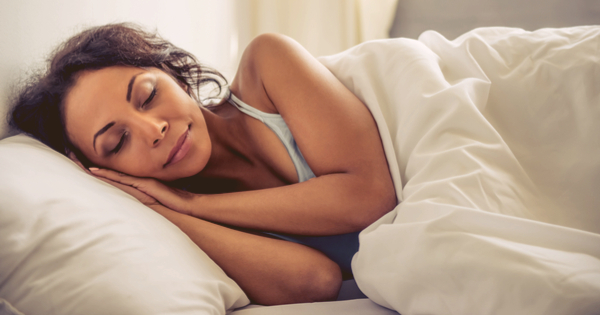10 Tips for Better Sleep
By Amy Sunderman, MS, RD

With all the distractions we face each day, especially during busy times of year for work, vacations, holidays and school, it can be difficult to fall asleep quickly and stay asleep through the night. It seems like we’re always on our phones, computers, TVs or all three, and using devices that emit blue light at night can make getting restful sleep more difficult than it needs to be.
Whether you are looking for a new nighttime tea, relaxing essential oils or other ways to promote rest and relaxation, we’ve got you covered. Check out these tips for getting a better night’s sleep.
1 Stick to a Sleep Schedule
Try to go to sleep and wake up at roughly the same time each day, including weekends. Your brain and body will start to get used to this routine, making it easier for you to not rely on hitting the snooze button in the morning or staring at the ceiling at night.
2 Create a Bedtime Ritual and Follow It
Do the same things each night before bed to wind down, whether that means taking a warm bath or shower, reading a book, listening to a relaxing playlist or something else. Try to avoid including the TV, your phone or other devices in this nightly routine because bright lights and devices that emit blue light can mimic daylight and might affect natural nighttime cues—like melatonin production—that help your body and brain prepare for sleep.
3 Avoid Naps, Especially in the Afternoon
A mid-afternoon nap may seem like a good idea, but if you fall asleep for more than 20 minutes it may disrupt your sleep later that evening. If you start to feel tired during the day, go on a short walk, drink more water or listen to some music.
4 Exercise Throughout the Day
Regular exercise can have many health benefits, including helping you sleep better. Don’t exercise too hard late at night. Aim for three to four hours before bed so your body and mind have time to relax. Gentle exercises like yoga or tai chi can help you unwind and start your nighttime routine.
5 Use Essential Oils
Whether you apply them topically with a carrier oil or use them in a diffuser, essential oils can help you unwind. One of the most common essential oils used to help the mind and body relax is lavender. Other popular essential oils for promoting relaxation are ylang ylang, chamomile, bergamot, sandalwood and cedarwood.
6 Get Rid of Distractions
Go deviceless before bed. Turn off your TV, laptop, phone and other sources of blue light at least an hour before you go to bed. Also, dimming the lights can help signal your brain that it’s time to start winding down for the night.
7 Pay Attention to What You Eat and Drink
Try not to be too hungry or full when you go to bed. A light nighttime snack is fine, but try to avoid eating a big meal within a few hours of going to sleep. Nicotine, caffeine and alcohol can also disturb your sleeping habits, so limit those as best you can before bed.
8 Drink Some Caffeine-Free Tea
If you like to drink something late at night, opt for caffeine-free tea. The most popular nighttime teas are chamomile, valerian root and passionflower. Those and other herbal teas are known for promoting rest and relaxation.
9 Try a Sleep Supplement
Melatonin and valerian root are common supplements that help support healthy sleep. Both can help you fall asleep faster and stay asleep longer. Start with a low dose and build up from there if necessary.
10 Make Your Bedroom Cool, Dark and Quiet
Minimize noises, lights or other distractions to help you wind down for the evening. Use an eye mask, earplugs or a fan to block light and outside noises, or anything else you think would be beneficial in helping you fall and stay asleep. This will all help your mind and body relax without unwanted interruptions.
Proper nutrition plays a huge role in your wellness journey, and we’re excited to take that journey with you.
Sign up for Swanson Health emails to be the first to know about new articles and special promotions.

About Amy Sunderman, MS, RD
Director of Science & Innovation, Registered Dietitian, Swanson Health
Amy is a registered dietitian, nutritionist and author with over 20 years of experience in the supplement industry. Amy is passionate about dietary supplements and the health benefits they offer. She enjoys working to find novel nutritional ingredients with strong clinical research behind them to drive innovation and provide health-promoting products to consumers.
Sources
Sleep tips: 6 steps to better sleep. Mayoclinic.org. https://www.mayoclinic.org/healthy-lifestyle/adult-health/in-depth/sleep/art-20048379 (Accessed 11/25/2017)
10 Tips to Beat Insomnia. WebMD.com. https://www.webmd.com/women/guide/insomnia-tips (Accessed 11/25/2017)
Updated on November 25, 2017
*These statements have not been evaluated by the Food and Drug Administration. These products are not intended to diagnose, treat, cure or prevent any disease.












LEAVE A COMMENT :
Comments sort : Newest / Oldest / Most Upvoted